
Hans Christian Andersen was born April 2, 1805 in Odense, Denmark to a poor shoemaker father and washerwoman mother. Andersen’s childhood in Odense would greatly influence his writing in later years. Inspiration for his fairy tales came from the rich oral tradition of folk tales told to him by the elderly patients at the Odense Hospital. His artistic dreams were given focus by his encounters with the formal arts through the Odense theatre.
Growing up, Andersen was deeply impacted by the stark contrasts in experience between the impoverished and well-to-do in Odense and desperately sought to escape his own poverty through the arts. This desperation would drive him to run away in 1819 at the age of 14, where for three years he’d attempt to join The Royal Theatre in Copenhagen— no matter the role. While his talents as a dancer, singer, and actor were wholly rejected, his raw talent as a playwright attracted the attention of two influential families who’d send him to school in Slagelse and Elsinore. Andersen would eventually return to Copenhagen and publish his first work in 1829, it was there that Andersen rose to literary fame through his fairy tales, plays, and novels. His fairy tales particularly would gain him international fame.
Scholars of Andersen’s life have noted how his past influenced the themes of his work. Despite achieving his dreams and rising in social station, Andersen felt as if he was caught between two worlds— the proletariat and bourgeoisie— and didn’t fully belong to either. This feeling of being trapped in an in-between was most famously explored in his works The Little Mermaid (1837) and The Mulatto (1840). Andersen was a Christian and religion played an important role in several of his works, such as The Little Match Girl (1845) and The Fir Tree (1844), where characters experience God and the divine through the bittersweet moments and mortality. Andersen’s poetry and travelogues are also sited in demonstrating his belief in the desire and discovery of the divine through nature. However, not all of his works were deep meditations on his life experiences or religious beliefs, with many being downright humorous! The Princess and the Pea (1835) and The Emperor’s New Clothes (1837) come to mind as tongue-in-cheek parables of the vainness, arrogance, and ludicrousness of the aristocracy.
Hans Christian Andersen’s fairy tales have had incredible staying power within the world of literature. This success is due in part to his wide range of tales - 212 in total! This ranged from endings that were tragic to happily-ever-after, from adventures to parables, and everything in between. The larger part, however, is how they can spark our imagination— from worlds unknown to the intimately familiar— Andersen’s works inspire others to join him in his world or build their own. Happy birthday Hans Christian Andersen! You can check out these collections of Andersen’s works, or ones inspired by his own. You can also read more on our Biography in Context database.
The Stories Of Hans Christian Andersen: A New Translation From The Danish
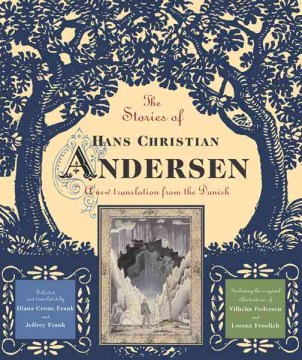
by
“In this collection are twenty-two tales that best represent Andersen's literary legacy. Here are the classics, "The Little Mermaid," "The Ugly Duckling," "Thumbelisa," and "The Princess on the Pea" among them, as well as largely unfamiliar stories like "By the Outermost Sea." Illuminating notes clarify references in the stories. And in an extended introductory essay, the Franks explore the writer and his times, placing the enigmatic and often bizarre figure of Andersen among his literary contemporaries, such as Charles Dickens and Søren Kierkegaard, with whom he crossed paths. Illustrated with the delicate and beautiful drawings that accompanied the original Danish publication, The Stories of Hans Christian Andersen is sure to delight readers of all ages.” ─ Provided by GoodReads.
The Annotated Hans Christian Andersen
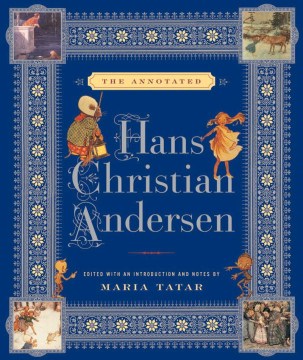
by
“In her most ambitious annotated work to date, Maria Tatar celebrates the stories told by Denmark's "perfect wizard" and re-envisions Hans Christian Andersen as a writer who casts his spell on both children and adults. Andersen's most beloved tales, such as The Emperor's New Clothes, The Ugly Duckling and The Little Mermaid are now joined by The Shadow and Story of a Mother, mature stories that reveal his literary range and depth. Tatar captures the tales' unrivaled dramatic and visual power, showing exactly how Andersen became one of the world's ten most translated authors, along with Shakespeare, Dickens, and Marx.
Lushly illustrated with more than one hundred fifty rare images, many in full color, by artists such as Arthur Rackham and Edmund Dulac, The Annotated Hans Christian Andersen will captivate readers with annotations that explore the rich social and cultural dimensions of the nineteenth century and construct a compelling portrait of a writer whose stories still fascinate us today.” ─ Provided by GoodReads.
The Magic Fish

by
The Little Mermaid Retelling, YA/Middle Grade, Graphic Novel, LGBT+, Fiction
"Real life isn't a fairytale. But Tié̂n still enjoys reading his favorite stories with his parents from the books he borrows from the local library. It's hard enough trying to communicate with your parents as a kid, but for Tié̂n, he doesn't even have the right words because his parents are struggling with their English. Is there a Vietnamese word for what he's going through? Is there a way to tell them he's gay?"─ Provided by publisher.
The Chinese Emperor’s New Clothes
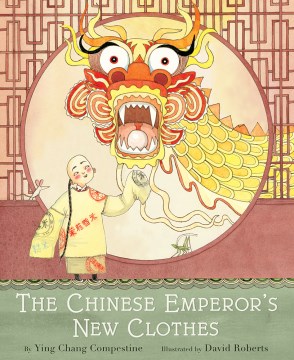
by
The Emperor’s New Clothes Retelling, Picture Book, Alternate Ending
“Ming Da is only nine years old when he becomes the emperor of China, and his three advisors take advantage of him by stealing his stores of rice, gold, and precious stones. But Ming Da has a plan. With the help of his tailors, he comes up with a clever idea to outsmart his devious advisors: He asks his tailors to make “magical” new clothes for him. Anyone who is honest, the young emperor explains, will see the clothes’ true splendor, but anyone who is dishonest will see only burlap sacks. The emperor dons a burlap sack, and the ministers can’t help but fall for his cunning trick.”─ Provided by GoodReads.
The Princess And The Pea
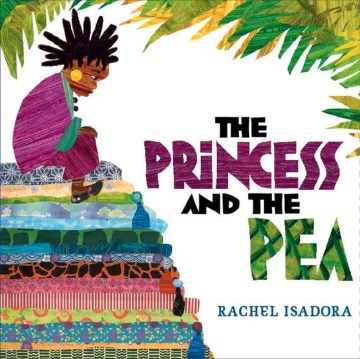
by
The Princess and the Pea Retelling, Picture Book, Fairy Tale
“When a prince sets out to find a princess to marry, he soon discovers this is not a simple task. There is no shortage of so-called princesses, but how can he tell whether they are what they claim to be? Then one night, a great storm rages, there's a knock on the palace gate, and the prince's life is never the same.”—Provided by GoodReads.
The Girl Of The Wish Garden

by
Thumbelina Retelling, Picture Book, Poetry, Fairy Tale
“Author Uma Krishnaswami’s sensitive and poetic tale opens when Lina, a tiny girl no bigger than a thumb, is found in a flower by her mother. Because she is so tiny, adventure and mishap easily befall her — a giant frog leaves her stranded on a lily pad, she is freed by curious fish, then pestered by crazy bugs. Lina lives by herself in the depths of a forest until the cold of winter approaches and she begins to feel lonely. She encounters a mouse, who is happy to have someone to dust and sweep for him, but one day in the back room of his house Lina comes across the body of a swallow. The mouse is convinced the bird is dead but Lina, thinking she sees a wing tremble, brings it food and water. Amazingly, the swallow revives and the two of them fly together to the garden of wishes…”─ Provided by GoodReads.
Mermaids Never Drown: Tales To Dive For
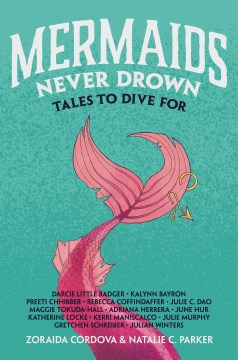
by
The Little Mermaid Retelling, YA, Anthology, Fantasy, LGBT+
“14 Young Adult short stories from bestselling and award-winning authors make a splash in Mermaids Never Drown - the second collection in the Untold Legends series edited by Zoraida Córdova and Natalie C. Parker - exploring mermaids like we've never seen them before!
A Vietnamese mermaid caught between two worlds. A siren who falls for Poseidon's son. A boy secretly pining for the merboy who saved him years ago. A storm that brings humans and mermaids together. Generations of family secrets and pain.”─ Provided by GoodReads.
Stain

by
The Princess and the Pea Retelling, YA, Gothic, Fantasy, Romance
“This high-fantasy gothic fairytale, inspired by Hans Christian Andersen’s The Princess and the Pea, takes place in an alternative medieval world split apart by magic. To win back her kingdom of perpetual day, save her night prince, and reunite the sun with the moon, a princess incapable of speech or sound must prove herself everything a traditional princess is not: tough enough to sleep on a bed of nails, and loud enough to be heard without a voice.” ─ Provided by GoodReads.
The Other Bennet Sister

by
The Ugly Duckling & Pride and Prejudice Retelling, Adult Fiction, Historical Fiction, Romance
“What if Mary Bennet’s life took a different path from that laid out for her in Pride and Prejudice? What if the frustrated intellectual of the Bennet family, the marginalized middle daughter, the plain girl who takes refuge in her books, eventually found the fulfillment enjoyed by her prettier, more confident sisters? This is the plot of The Other Bennet Sister, a debut novel with exactly the affection and authority to satisfy Austen fans.” ─ Provided by GoodReads.